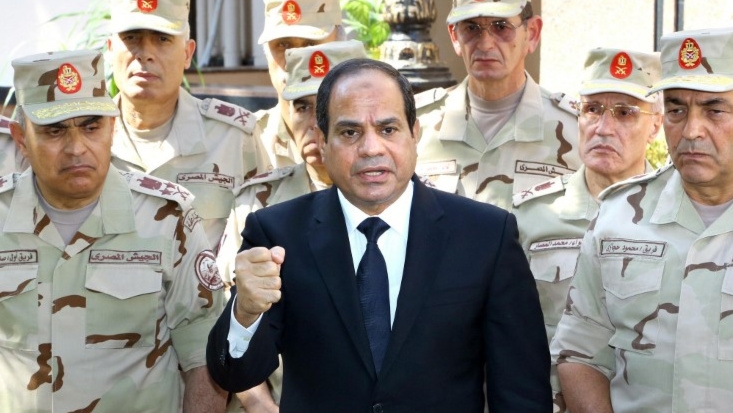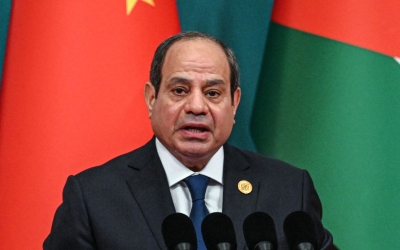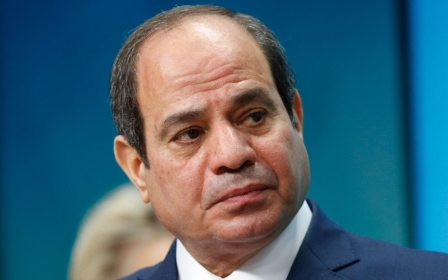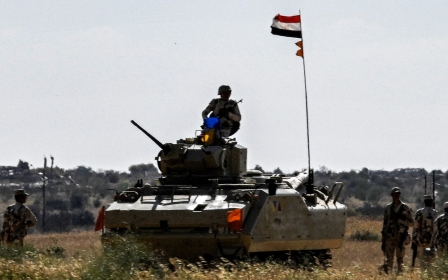Egypt's dark decade was built upon Sisi's dangerous bargain

A decade ago, Egypt’s Supreme Council of the Armed Forces announced its approval of Abdel Fattah al-Sisi as a candidate for president, laying out a fundamental principle that would become a cornerstone of his governance for the next 10 years: The interests of the military and its leadership were paramount. The entity that placed him in power was the only one capable of removing him.
Throughout this dark decade, the military’s role evolved from being a guardian of the state, as it had been for decades, to becoming the owner, manager and executor of all significant aspects of the nation.
In exchange for loyalty and obedience, Sisi has allowed the military to control the state’s wealth and institutions, with army personnel managing these resources primarily for their own benefit, free from accountability.
New MEE newsletter: Jerusalem Dispatch
Sign up to get the latest insights and analysis on Israel-Palestine, alongside Turkey Unpacked and other MEE newsletters
The long-established governance equation between the presidency and the military persists: The president holds ultimate authority, provided he maintains control and stability. In times of unrest, the military intervenes and imposes its conditions, as in the January 1977 uprising and the January 2011 revolution. This pattern was repeated after the massive protests in September 2019.
Sisi’s extensive experience in the military has played a crucial role in maintaining internal stability within the institution, in terms of curbing personal ambitions, preventing the formation of power centres, and employing both carrot and stick approaches.
Rapid and regular leadership changes have became a hallmark, institutionalised by reducing the tenure of senior military positions from four years to just two; Sisi retains the authority to extend them, ensuring absolute control and loyalty.
Wealth and privileges
Benefits, rewards and incentives for loyalty have expanded, flooding military officers with projects and positions that bring immense wealth and privileges, making any rebellion seem suicidal. Those who have dared to defy Sisi, such as former military chief of staff Sami Anan, have faced severe repercussions.
As with all of Egypt’s previous presidents, Sisi has worked tirelessly to secure his position, learning from the experiences of his predecessors. The events of January 2011 remain at the forefront of his mind, perhaps mentioned more in his own speeches than by the revolutionaries themselves.
The revolution that toppled Hosni Mubarak’s 30-year regime in 2011, when a massive surge of people overwhelmed security forces, left the ruling system utterly exposed. But the military soon reclaimed power with ease, just as it did in the summer of 2013 to oust Mohamed Morsi, capitalising on popular discontent.
The past decade has shown that the only escape from this vicious cycle is the return of power to its rightful owner: the Egyptian people
Sisi has focused on preventing another such occurrence by ensuring that no demonstrations, however small, can escalate into a full-blown uprising. He has crushed all attempts at organised peaceful dissent. His campaign of repression has exceeded any other period in modern Egyptian history.
The past decade has shown that the only escape from this vicious cycle is the return of power to its rightful owners: the Egyptian people, who must reclaim their role in holding authorities accountable. But movements need leadership and organisation, tools that Sisi has systematically destroyed.
Finding a way for the people to re-enter the political equation was a task undertaken by jailed opposition leader Ahmed Tantawy, myself and a group of our comrades. I served as a political adviser on Tantawy’s recent presidential campaign.
The strategy of what we called the “Hope Project” was to halt the cycle of despotism by reintegrating all segments of the population into the political process, strengthening political organisations and fostering an environment conducive to massive public engagement.
Global silence
We gambled on the return of the people through the ballot box, which we deemed safer and more secure than protests. What we didn’t anticipate were the terrifying scenes of thousands of thugs across the country preventing people from signing petitions to grant Tantawy his right to run for office.
Egypt’s security forces and state apparatuses entrenched themselves against the people’s will. Even if we had expected this, what could we have done against armed gangs assaulting citizens on the streets?
Even more astonishing was the international community’s silence. Not only did countries fail to condemn the anti-democratic actions of Sisi’s regime, but they also rewarded the repressive leader with billions of dollars to avert an economic meltdown.
A key reason for this is Sisi’s relationship with Israel. When it comes to Egypt, the international community is clearly concerned with only two things: preventing its collapse, which could send an influx of migrants to Europe’s shores, and ensuring Israel’s security - a task at which Sisi has excelled.
Before the 1952 military coup, multiple forces vied for power in Egypt: the king, the British occupation, and various political parties. The coup concentrated all authority in the hands of the president, with the military holding the keys to the presidency.
Former president Anwar Sadat then placed those keys in the hands of the United States, and with the growing influence of the Israel lobby in Washington, the importance of any regime governing Egypt became measured by its relationship with Israel.
Liberating Palestine
Sisi grasped this equation well, going beyond mere friendship with Tel Aviv to become a close ally. This partnership is mutually beneficial, as both are threatened by the prospect of democracy in Egypt.
For Sisi, democracy means losing his throne, especially after unprecedented levels of failure, repression and poverty in the country. For Israel, democracy in Egypt would likely produce a government reflecting the Egyptian people’s will - hostile towards Israel and and viewing itself as part of the Palestinian cause, an ideology unchanged since the 1940s, when scores of Egyptians travelled to Palestine to fight against invading Zionist gangs.
The significance of what’s happening in Gaza and across Palestine today cannot be overstated. For decades, the mantra has been that liberating Palestine from occupation starts with liberating Cairo from dictatorship, positing Egypt as the linchpin capable of uniting Arabs. But the opposite seems to be occurring.
The changes brought about by the Gaza war will shape not just Palestine’s future, but also Egypt’s - and perhaps the entire region’s. The shift in international public opinion against the Israeli occupation will be reflected in global policies towards Egypt.
Going forward, democracy and human rights could become the foundation of international relations with Egypt, moving away from the decades-long trend of supporting corrupt regimes solely to protect and aid Israeli occupation, even amid the large-scale genocide and ethnic cleansing in Palestine.
This situation underscores analyst Naomi Klein’s recent assertion that the "false idol of Zionism equates Israeli safety with Egyptian dictatorship and client states".
The views expressed in this article belong to the author and do not necessarily reflect the editorial policy of Middle East Eye.
Middle East Eye delivers independent and unrivalled coverage and analysis of the Middle East, North Africa and beyond. To learn more about republishing this content and the associated fees, please fill out this form. More about MEE can be found here.






